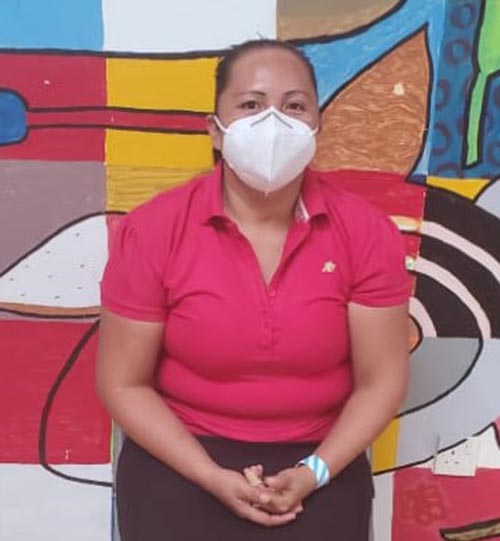We see them almost everywhere we go but it’s likely that few of us take notice of them or the efforts they put into their work, which is not as easy as it may appear. This is the life of a janitor.
At 34, Teresin Benjamin is a single mother of two who hails from Mora, Santa Rosa in the Moruca sub-district, where she works as a janitor at the Kumaka District Hospital. She has held the post for the last eight years.
Benjamin’s mother had also worked as a janitor at the hospital for 21 years. Now, five days a week, Benjamin finds herself tasked with cleaning the entire hospital, which consists of seven wards, 11 offices, 12 toilet facilities and three bathrooms. Though she has another janitor who assists her, of the two, she is the only one who is permanently employed at the hospital and so she is responsible for more of the cleaning. Benjamin said that she has always had someone to assist her but there was an 18-month period when she had no assistant cleaner and the cleaning of the entire institution was left all up to her.
As is to be expected, janitorial work is not for the squeamish and Benjamin has had to get used to encountering bodily fluids, including vomit, blood drops and pus. “The worst kind of things I have to deal with is blood from someone who had an accident, or patients vomiting or dealing with bandages you find in the dressing room. At first their [pungent smell] was a turn-off but I get accustomed to handling those things now,” Benjamin noted.
Despite how dirty the job gets, Benjamin is always ready. Every day, she noted, she always sees a bit of heaven after she has finished cleaning and she takes in the tidy and spotless environs.
Asked how she feels when a patient or staff members creates a mess after her clean up efforts, Benjamin said, “I don’t feel any way. I go back and clean it, that’s my work.”
From time to time someone will commend her work. Though it may be through a simple sentence or phrase, it makes her day better.
In light of the pandemic, Benjamin has her job cut out for her to see that she, staff at the hospital and patients do not contract COVID-19. Benjamin noted that she takes extra care against contracting the virus by wearing her personal protection equipment (PPE). She is always outfitted in a gown, long boots, a cap, gloves and her KN95 facemask whenever going about her job.
Almost on a daily basis she sees persons littering despite bins being close by. There are instances where patients, who lack respect for what she does, litter in front of her face. She doesn’t tell them anything. Instead, she quietly picks up the refuse and discards it. Patients who are unable to get to the bin will often leave empty wrappers and plastic bags on the tables next to them and Benjamin said in these cases she understands that they are unable to put their garbage in the bin themselves and takes care to clear their spaces.
Her work keeps her on her feet all day long and Benjamin seldom ever takes a break. Often, she goes looking to see if the cook needs help to prepare the meals for the patients or whether the laundress needs a hand washing the linens.
Since her job requires a lot of standing and she walks a 15-minute journey to and from work, the last eight years has taken a toll on Benjamin’s health. She experiences pains in her feet, which she has been treating with massages for some time now. They are not always helpful in relieving the pain.
Benjamin is the mother of two sons, who are 12 years, and eight months. She also lives with a sister and her 62-year-old mother. She is the only member of her household who earns a salary. Her meagre salary of $67,000 a month takes care of the household, including covering gasoline for the family’s generator.
Sometimes Benjamin works on weekends, or sometimes the weekend is her two days off. Nonetheless, the work never stops for Benjamin. When she is home, she’s usually preoccupied with chores, especially the laundry. With no access to potable water, she and her family rely on the rain water stored in their water tank. However, when this runs out she has to go to the pond in the area to do her washing.
While janitorial services are no thrill and definitely take some getting used to, knowing that she makes the hospital safer for those who are there, especially at a time when the world is battling the COVID-19 pandemic, gives Benjamin satisfaction. As a result, she does her job diligently and without complaining. “I had decided that whatever [responsibilities] came with the job, I would do it,” she said.






